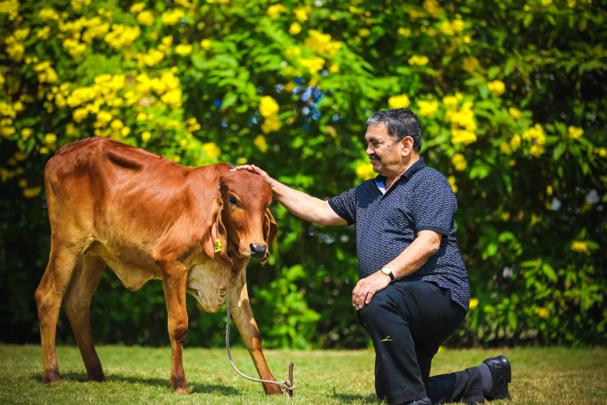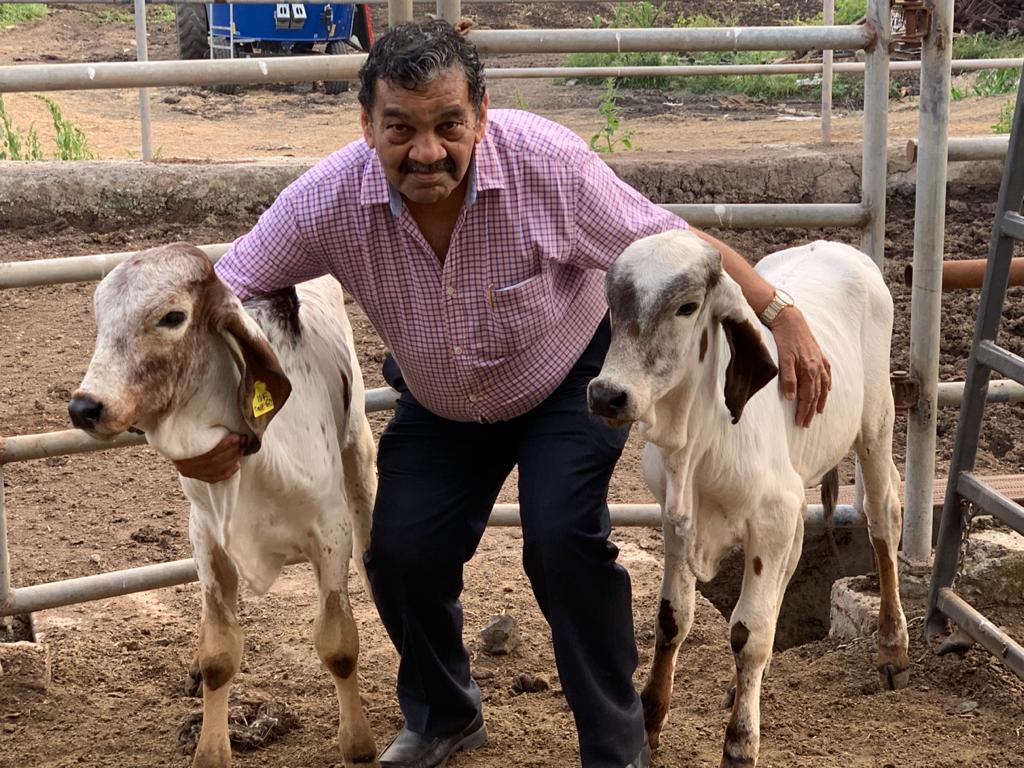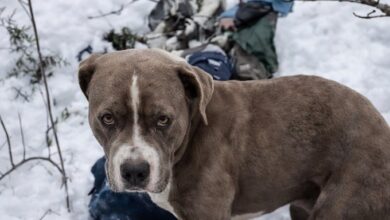IVF: YES, FARMERS’ INCOME CAN BE DOUBLED. HERE’S HOW!
Dr. Shyam Zawar, national mentor, IVF labs, Govt of India.

Using IVF technology, the farmers income can be doubled. Indiainput.com spoke to Dr Shyam Zawar, India’s leading name in the field.
By Dr.Namrata Mishra Tiwari
Does PM Modi’s vision of doubling up the farmers’ income appears an upheal task to you? Does it look somewhat impossible? We spoke to Dr Shyam Zawar, rated among the topmost senior veterinary scientists in India, who has been, very recently, assigned the national mentorship of IVF labs in India by the union ministry of fisheries, animal husbandry and dairying on November 1st, 2021. As someone who has been credited with many firsts in animal husbandry, Dr Zawar gave us a sense of what new advanced technologies are capable of.
To put it in his words, – ‘There can be one calf from a cow in a year. That is the general pace of rural economy. But switching to the advanced technology, we can have 125 calves from one cow in a span of just two years. This can be achieved by transferring the embryos to other recipient cows. An accomplishment in just two years that would have normally taken 125 years. It is no miracle. This has been made possible already. Planned use of advanced technologies can make wonders.’
‘Our PM Shri Narendra ji Modi’s vision is to double the farmers’ income. He wants the advanced technologies available to be used to realise the goal. The Union ministry of Fisheries, Animal Husbandry and Dairying has prepared a phenomenal, visionary mission document towards the goal. As a mentor, with whatever experience and knowledge that I have, I wish to contribute to the realisation of the vision,’ says Dr Zawar, who has been instrumental in pioneering the use of embryo transfer and IVF technology in sheeps, cows and buffaloes in India.
Dr Zawar on his early days
Born in a simple farmer’s family in Maharashtra’s Nanded, he always nurtured the ambition of joining the medical field. Upon clearing his twelfth standard exam, he was selected for admission in the Govt Dental college at Mumbai. However, it was too expensive for someone hailing from a humble farming family from Marathwada. Not to be bowed down easily, he opted for veterinary science education, at the Bombay Veterinary College, the oldest veterinary college in the country that was founded in 1886. Dr Zawar recalls, – I had joined the college in 1968. The main attraction of the college was a stipend of rupees forty. I graduated with distinction in 1972 and never repented for being a veterinarian. When enrolled for masters in animal reproduction, I used to work during night hours to sustain financially and study during the day. Thats how I topped the masters program.
Bringing advanced technologies like IVF to India
Commenting on his long and successful association with Raymonds & JK Trust, Dr. Shyam Zawar recalls, – I was immediately selected by Raymonds. They had a sheep breeding farm established in 1970, by Late Chairman Shri Gopalkrishna Singhania in Maharashtra’s Dhule district. They had about ten thousand acre land acquired from the government on long lease and had brought six thousand sheep from Australia. They were looking for a veterinarian with masters in animal reproduction. On selection, I joined them on 2nd May 1975 at Raymond’s Sheep & Wool Research Development Division at Dhule. We were the first in India to start embryo transfer technology in sheep. Raymonds was the first to bring this advanced technology to India in 1975. We had experts from Australia who came and trained me into embryo transfer in sheep. Then, I went to Australia in 1977 for my advanced training. The whole objective was to improve the quality and the quantity of wool. We did a lot of pioneering work in India there in Dhule, during that period. I was there till 1983 when we had organized a national conference. We could demonstrate how the embryo looked like under the microscope and how did the embryo transfer take place. All this was not known to many. But sadly, due to labour problems and some political reasons, we had to close down such an excellant farm in Dhule in the same year in 1983. We donated all those sheeps to the Government of Maharashtra and all that happened. In 1983, I moved to Bilaspur in Chhattisgarh where Raymonds had a Cement plant. We were having a lot of issues with the milk available there for our engineers & staff. So we established a dairy project and a cattle breeding farm there. Subsequently, it was named Raymonds Cattle Embryo Research Center. I continued my interest in embryo transfer technology and could extend it to cows. I went to Texas, US in 1985 for advanced training in embryo transfer in cows. This was again the first time in our country that such an advanced technology was brought in. On my return, we began our work in various aspects of embryo transfer in cattle, that could prove beneficial and useful in India. The aim was to increase the genetically superior cows via production of embryos. A lot of research work was undertaken in cattle reproduction, nutrition and health management till 1997 at our farm.
The same year, a thought struck me regarding artificial insemination in local cows. A trust was then launched as JK Trust Gram Vikas Yojana and I began working on the artificial insemination. The Jila Panchayat of Bilaspur came forward and we started a public private partnership programme by doing artificial insemination of cows by reaching at the farmers’ doorsteps. Local educated but unemployed youths were roped in as volunteers to reach out to the villages. They were aptly and uniquely nicknamed as Gopal. Those were the days of undivided Madhya Pradesh and with the help of our volunteers we could reach out to all parts of the state. In 1998, the then CM of Andhra Pradesh, Shri Chandrababu Naidu visited our farm and invited us to AP. We began work in two districts there, Chittoor and Anantpur. Gradually the work spread in other parts of the country. Within just four years, we reached ten states and opened five thousand artificial insemination centers for cows. Thus we were providing services in fifty thousand villages, thereby benefitting almost five million farmers. With such a rapid increase in the scale and volume of the task, JK Trust became one of the largest NGOs in the field of Animal Husbandry.
He further adds, -In the year 2000, I moved to Mumbai and for the next fifteen years, I was very busy, monitoring the artificial insemination programme across the country, as the CEO of JK trust. In 2016, I decided to shift to the advanced technology of IVF. Among us humans, this is commonly known as test tube baby technology. I, along with three of our scientists, visited US for the training in IVF Technology. On return, a world class IVF Technology Laboratory was established in Wadgaon, in Pune’s Shirur tahsil. An enormous amount of pioneering work was launched from here and it still continues, after having produced so many calves and even from the frozen embryos etc. Another first came when we extended further and launched similar initiatives for buffaloes.

On 15th Dec 2020, our Prime Minister Shri Modi spoke during a programme at Kutch, about the positive features of the Banni breed of buffaloes, that are mostly found in Gujrat. It is a very good, hard and a tough breed. Coincidentally, the very next day, we were successfully using the artificial IVF Technology in Banni breed of buffaloes at the doorstep of a farmer in Gujrat’s Somnath district. So far six calves have been born using this advanced technology among Banni buffaloes.
During the Covid pandemic, Dr Zawar switched to addressing webinars almost every day, utilizing the lockdown period to the optimum. Some of the webinars in 12 prominent languages of India can be seen on the trust’s YouTube channel.
New assignment
Meanwhile in 1990, Dr Zawar had done PhD on ‘Superovulation and Embryo transfer in sheep, goat and cattle.’ This was also declared as the first PhD thesis on this subject in the country. Subsequently, Dr Zawar has also done two year part time Senior Management programme at IIM Kolkata followed by a Senior Management Programme at London Business School and a short programme of senior Management at Harward business school.
After 46 years of pioneering and eventful work in livestock development at Raymonds and then JK Trust, he retired on 31st of Oct 2021. The next day, he got the prestigious honorary assignment from the union ministry of fisheries, animal husbandry and dairying, wherein he has been appointed as the national mentor for the ET IVF labs across the nation. There are estimated 30 such labs in India, funded by the Rashtriya Gokul Mission, one of the flagship programmes by the Government of India. These labs are in different stages right now.
When requested to comment on the latest challenge in his illustrious career, the senior scientist says -This is an honorary position and I have accepted it with respect and honour of serving the nation and sharing whatever knowledge and experience that I have, in the nation’s interest. The ultimate goal has always been to alleviate poverty, to reduce malnutrition and to generate employment. There are so many success stories of farmers who adopted the IVF technology. There is also the option of using sex sorted semen to increase the number of cows in India. The PM has a vision of doubling the farmers’ income using the advanced technologies. If I am able to contribute even smallest to the noble program, it would be deeply satisfying to me as an Indian !
‘India Input’ wishes the man and the team all the success for the endeavor to contribute in realizing the PM’s revolutionary vision that has a potential to transform India’s rural economy.
(images: Dr. Shyam Zawar)
YouTube channel of JK Trust :
https://youtube.com/channel/UC6JMAcgC0AxQ35BT74gaOQQ




